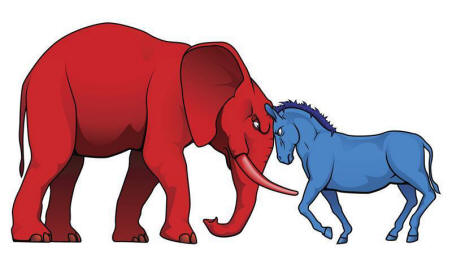|
by Susanne Posel from OccupyCorporatism Website
Elections for this mid-term year bring voters out by droves; a massive testimony to the motivated reasoning that permeates the American ideology in such an overpowering way.
Neil Malhotra, associate professor of political economy for Stanford Graduate School of Business (SGSB) explained that motivated reasoning (MR),
MR is defined as being,
It is a well-known fact that financial contributors sway political decision-making; however voters ignore this point in order to place their vote.
Back in April, the US Supreme Court, in a 5-4 ruling, decided that there cannot be caps on financial contributions to campaigns, PACs or parties because to restrict this practice would be unconstitutional.
Aggregate limits, the USSC stated, was a violation of the 1st Amendment.
Chief Justice John Roberts, along with Justices Antonin Scalia, Anthony Kennedy and Samuel Alito ruled that aggregate limits "do not prevent corruption".
The Justices wrote:
Bradley Smith, election expert and founder of the Center for Competitive Politics (CCP) said:
CU (Citizens United) supports corruption in politics as it established corporate "personhood" which is a legal fiction that is enacted as if it were true.
The emphasis on money paves the way for censorship of the 1st Amendment because CU promises that those with the money can purchase legislation that suits them.
CU has allowed corporations and unions to coerce with cash and control members of Capitol Hill that can be purchased. It is clear, through research, that since CU, spending has increased for midterm elections.
Republicans have received noticeable amounts of cash from individuals and corporations that want to make sure their favorite candidate makes it to office. The GOP has invested in more TV adverts.
CU can be seen as responsible for injecting cash into the hands of non-profit organizations because disclosures of amounts are not required.
Brendan Doherty, political scientist at the US Naval Academy, explained how presidents raise money.
Doherty said:
|

